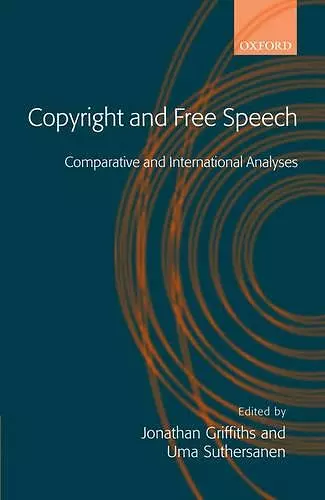Copyright and Free Speech
Comparative and International Analyses
Jonathan Griffiths editor Uma Suthersanen editor
Format:Hardback
Publisher:Oxford University Press
Published:7th Apr '05
Currently unavailable, and unfortunately no date known when it will be back

Written by a team of leading scholars and practitioners in the fields of copyright and free speech, this work analyses the potential for interaction and conflict between the two rights. Free speech is the lifeblood of any democracy. As John Stuart Mill stated, "In government, perfect freedom of discussion in all its modes - speaking, writing, and printing - in law and in fact is the first requisite of good because the first condition of popular intelligence and mental progress." (Letter by John Stuart Mill, 18 March, 1840) Copyright, on the other hand, represent a property regime which protects human creativity as manifested in all types of expressions such as literary works, paintings and music. Both these notions, copyright and free speech, are united in the fact of their recognition as fundamental freedoms of all individuals within the national, regional and international framework of human rights. However, the rights are also antithetical in nature, giving rise to both political and jurisprudential tensions. These tensions have become recently accentuated by the advent of legislative developments. Both in the United States and within the European Union, legal commentators argue that recent copyright legislation has paid insufficient regard to free speech. This concern is underlined by the series of First Amendment challenges that have been brought against the United States Digital Millennium Copyright Act. The recent causes celèbres not only highlight the antagonistic relationship between copyright and free speech but also prominently depict the potential conflict between public and private interests in information - the Dead Sea Scrolls decision (Israel), the Wind Done Gone, Eldred and DeCSS cases (United States) and the Hyde Park v Yelland and Ashdown v Telegraph Group (United Kingdom). A further query which requires attention is the impact of the growing significance of international copyright law for the developing world. The raised profile of these conflicts has resulted in an increasing amount of attention from academe and the legal profession. Some of the authors of this volume have made influential contributions and are directly involved, both legally and politically, in the debate. There has, however, been no sustained study of the conflict across a variety of different jurisdictions. This book addresses the copyright/free speech relationship within a comparative and international legal framework. Moreover, the key questions regarding access to information and the digital challenges are addressed from both theoretical and practical perspectives.
a substantial collection of papers by authors of distinction on a fascinating subject. The scholarship distilled is impressive...has been skilfully edited and well indexed to make it of great value to researchers. It is a book which can be read with interest in its entirety and would be a useful addition to any law library. * Robyn Durie, Convergence *
ISBN: 9780199276042
Dimensions: 240mm x 161mm x 30mm
Weight: 842g
476 pages